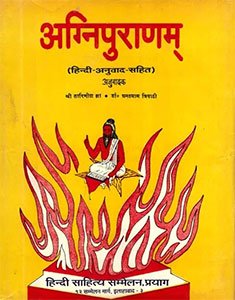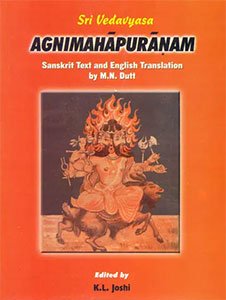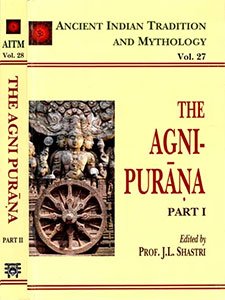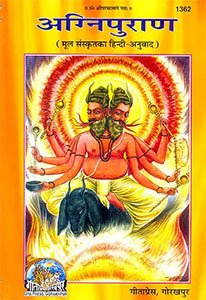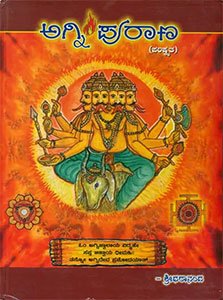Agni Purana [sanskrit]
97,288 words
This Sanskrit edition of the Agnipurana. It is one of the traditional eighteen Mahapuranas presented as an encyclopedia of ancient Indian history and knowledge. It contains either 382 or 383 chapters and over 10.000 verses (Sanskrit Shlokas).
Verse 315.7
ओं शत्रुमुखस्तम्भनी कामरूपा आलीढक्करी ।
ह्रीं फें फेत्कारिणी मम शत्रूणां देवदत्तानां मुखं स्तम्भय ।
मम सर्व्वविद्वेषिणां मुखस्तम्भनं कुरु ओं हूँ फेँ फेत्कारिणि स्वाहा ।
फट् हेतुञ्च समालिख्य तज्जपान्तं महाबलं ।
वामेनैव नगं शूलं संलिखेद्दक्षिणे करे ॥ ७ ॥
oṃ śatrumukhastambhanī kāmarūpā ālīḍhakkarī |
hrīṃ pheṃ phetkāriṇī mama śatrūṇāṃ devadattānāṃ mukhaṃ stambhaya |
mama sarvvavidveṣiṇāṃ mukhastambhanaṃ kuru oṃ hūṃ pheṃ phetkāriṇi svāhā |
phaṭ hetuñca samālikhya tajjapāntaṃ mahābalaṃ |
vāmenaiva nagaṃ śūlaṃ saṃlikheddakṣiṇe kare || 7 ||
The Sanskrit text of Verse 315.7 is contained in the book The Agni Puranam (Anandashram Edition) by Shri Chimna Apate (श्री चिमणा आपटे). This book is available online or you could buy the latest edition:
Read online Buy now! The Sanskrit text by Shri Chimna Apate (श्री चिमणा आपटे) (1987)
Glossary of Sanskrit terms
Note: This extracts Sanskrit terms and links to English definitions from the glossary, based on an experimental segmentation of verse (315.7). Some terms could be superfluous while some might not be mentioned. Click on the word to show English definitions.
Shatru, Ukha, Bha, Kamarupa, Ali, Alin, Dhakka, Hrim, Pha, Phi, Phetkarini, Phetkarin, Asmad, Devadatta, Mukha, Stambhana, Hum, Svaha, Phat, Sama, Alikhya, Tajja, Panta, Pat, Mahabala, Vama, Naga, Shula, Dakshine, Dakshina, Kari, Kara,
Analysis of Sanskrit grammar
Note: this is an experimental feature and only shows the first possible analysis of the Sanskrit text (Verse 315.7). If the system was successful in segmenting the sentence, you will see of which words it is made up of, generally consisting of Nouns, Pronouns, Verbs, Participles and Indeclinables. Click on the link to show all possible derivations of the word.
- Line 1: “oṃ śatrumukhastambhanī kāmarūpā ālīḍhakkarī ”
- Cannot analyse om*śa
- śatrum -
-
śatru (noun, masculine)[accusative single]
- ukhas -
-
ukha (noun, masculine)[nominative single]
- tam -
-
ta (noun, masculine)[adverb], [accusative single]ta (noun, neuter)[adverb], [nominative single], [accusative single]tā (noun, feminine)[adverb]tan (noun, masculine)[adverb]sa (noun, masculine)[accusative single]
- bha -
-
bha (noun, masculine)[compound], [vocative single]bha (noun, neuter)[compound], [vocative single]
- nī -
-
nī (noun, masculine)[compound]nī (noun, feminine)[compound]ni (noun, masculine)[nominative dual], [vocative dual], [accusative dual]ni (noun, feminine)[nominative dual], [vocative dual], [accusative dual]
- kāmarūpā* -
-
kāmarūpa (noun, masculine)[nominative plural], [vocative plural]kāmarūpā (noun, feminine)[nominative plural], [vocative plural], [accusative plural]
- ālī -
-
ālī (noun, feminine)[compound], [nominative single]āli (noun, feminine)[nominative dual], [vocative dual], [accusative dual]āli (noun, masculine)[nominative dual], [vocative dual], [accusative dual]ālin (noun, masculine)[nominative single]
- ḍhakka -
-
ḍhakka (noun, masculine)[compound], [vocative single]
- rī -
-
rī (noun, feminine)[compound]
- Line 2: “hrīṃ pheṃ phetkāriṇī mama śatrūṇāṃ devadattānāṃ mukhaṃ stambhaya ”
- hrīm -
-
hrīm (indeclinable)[indeclinable]
- phe -
-
pha (noun, masculine)[compound], [vocative single], [locative single]pha (noun, neuter)[compound], [nominative dual], [vocative single], [vocative dual], [accusative dual], [locative single]phā (noun, feminine)[nominative single], [nominative dual], [vocative single], [vocative dual], [accusative dual]phi (noun, masculine)[vocative single]
- im -
-
i (noun, masculine)[accusative single]
- phetkāriṇī -
-
phetkāriṇī (noun, feminine)[compound], [nominative single]phetkārin (noun, neuter)[nominative dual], [vocative dual], [accusative dual]
- mama -
-
asmad (pronoun, none)[genitive single]√mā (verb class 2)[perfect active second plural]√mā (verb class 3)[perfect active second plural]√mā (verb class 4)[perfect active second plural]√mā (verb class 1)[perfect active second plural]
- śatrūṇām -
-
śatru (noun, masculine)[genitive plural]
- devadattānām -
-
devadatta (noun, masculine)[genitive plural]devadatta (noun, neuter)[genitive plural]devadattā (noun, feminine)[genitive plural]
- mukham -
-
mukha (noun, masculine)[adverb], [accusative single]mukha (noun, neuter)[adverb], [nominative single], [accusative single]
- stambhaya -
-
√stambh (verb class 0)[imperative active second single]
- Line 3: “mama sarvvavidveṣiṇāṃ mukhastambhanaṃ kuru oṃ hūṃ pheṃ phetkāriṇi svāhā ”
- mama -
-
asmad (pronoun, none)[genitive single]√mā (verb class 2)[perfect active second plural]√mā (verb class 3)[perfect active second plural]√mā (verb class 4)[perfect active second plural]√mā (verb class 1)[perfect active second plural]
- Cannot analyse sarvvavidveṣiṇām*mu
- mukha -
-
mukha (noun, masculine)[compound], [vocative single]mukha (noun, neuter)[compound], [vocative single]
- stambhanam -
-
stambhana (noun, masculine)[adverb], [accusative single]stambhana (noun, neuter)[adverb], [nominative single], [accusative single]stambhanā (noun, feminine)[adverb]
- kuru -
-
kuru (noun, feminine)[compound], [adverb]kuru (noun, masculine)[compound], [adverb]√kṛ (verb class 8)[imperative active second single]
- Cannot analyse om*hū
- hūm -
-
hūm (indeclinable)[indeclinable]
- phe -
-
pha (noun, masculine)[compound], [vocative single], [locative single]pha (noun, neuter)[compound], [nominative dual], [vocative single], [vocative dual], [accusative dual], [locative single]phā (noun, feminine)[nominative single], [nominative dual], [vocative single], [vocative dual], [accusative dual]phi (noun, masculine)[vocative single]
- im -
-
i (noun, masculine)[accusative single]
- phetkāriṇi -
-
phetkāriṇī (noun, feminine)[adverb], [vocative single]phetkārin (noun, masculine)[locative single]phetkārin (noun, neuter)[locative single]
- svāhā -
-
svāhā (indeclinable)[indeclinable]svāhā (noun, feminine)[nominative single]
- Line 4: “phaṭ hetuñca samālikhya tajjapāntaṃ mahābalaṃ ”
- phaṭ -
-
phaṭ (indeclinable)[indeclinable]
- Cannot analyse hetuñca*sa
- samā -
-
sama (noun, masculine)[compound], [vocative single]sama (noun, neuter)[compound], [vocative single]samā (noun, feminine)[nominative single]√sam (verb class 1)[imperative active second single]
- ālikhya -
-
ālikhya (indeclinable)[indeclinable]
- tajja -
-
tajja (noun, masculine)[compound], [vocative single]tajja (noun, neuter)[compound], [vocative single]
- pāntam -
-
pānta (noun, masculine)[adverb], [accusative single]pāt (noun, masculine)[adverb], [accusative single]√pā -> pāt (participle, masculine)[accusative single from √pā class 2 verb]√pā -> pāt (participle, masculine)[accusative single from √pā class 2 verb]
- mahābalam -
-
mahābala (noun, masculine)[adverb], [accusative single]mahābala (noun, neuter)[adverb], [nominative single], [accusative single]mahābalā (noun, feminine)[adverb]
- Line 5: “vāmenaiva nagaṃ śūlaṃ saṃlikheddakṣiṇe kare ”
- vāmenai -
-
vāma (noun, masculine)[instrumental single]vāma (noun, neuter)[instrumental single]
- aiva -
-
√i (verb class 2)[imperfect active first dual]
- nagam -
-
naga (noun, masculine)[adverb], [accusative single]
- śūlam -
-
śūla (noun, masculine)[adverb], [accusative single]śūla (noun, neuter)[adverb], [nominative single], [accusative single]śūlā (noun, feminine)[adverb]
- saṃ -
-
sa (noun, neuter)[adverb], [nominative single], [accusative single]sam (Preverb)[Preverb]
- likhed -
-
√likh (verb class 6)[optative active third single]
- dakṣiṇe -
-
dakṣiṇe (indeclinable)[indeclinable]dakṣiṇa (noun, masculine)[nominative plural], [locative single]dakṣiṇa (noun, neuter)[nominative dual], [vocative dual], [accusative dual], [locative single]dakṣiṇā (noun, feminine)[nominative dual], [vocative single], [vocative dual], [accusative dual]
- kare -
-
kari (noun, masculine)[vocative single]kari (noun, feminine)[vocative single]kara (noun, masculine)[locative single]kara (noun, neuter)[nominative dual], [vocative dual], [accusative dual], [locative single]√kṛ (verb class 1)[present middle first single]
Other editions:
Also see the following editions of the Sanskrit text or (alternative) English translations of the Verse 315.7
Agni Purana with Hindi Translation
by Tarinish Jha and Dr. Ghanshayam Tripathi (तारिणीश् झा और डॉ. घनश्याम त्रिपाठी) (2007)
Publisher: Hindi Sahitya Sammelan, Allahabad; 1199 pages; Title: अग्निपुराणम् (संस्कृत एवं हिन्दी अनुवाद);
Buy now!
Agni Purana (Two Volumes)
by M. N. Dutt (2023)
Publisher: Parimal Publication Pvt. Ltd.; Editor: K. L. Joshi.; ISBN-10: 8171101690; ISBN-13: 9788171101696; 1070 pages.
Buy now!
Agni-Purana (Set of 4 Volumes)
by N. Gangadharan (2006)
Publisher: Motilal Banarsidass Publishers Pvt. Ltd.; ISBN: Part I 8120803590 (9788120803596); Part II 8120803604 (9788120803602); Part III 8120801741 (9788120801745); Part IV 812080306X (9788120803060); 1271 pages.
Buy now!
The Agni Purana (Hindi)
by (2013)
Publisher: Gita Press, Gorakhpur; Title: अग्निपुराण (केवल हिन्दी अनुवाद); ISBN-10: 8129302934; ISBN-13: 9788129302939; 848 pages.
Buy now!
Agni Purana (Kannada)
by Sreedharananda (2013)
Publisher: Pooja Pusthaka Bhandara, Bangalore; Title: ಅಗ್ನಿ ಪುರಾಣ; 560 pages.
Buy now!Preview of verse 315.7 in Kannada sript:
ಓಂ ಶತ್ರುಮುಖಸ್ತಮ್ಭನೀ ಕಾಮರೂಪಾ ಆಲೀಢಕ್ಕರೀ ।
ಹ್ರೀಂ ಫೇಂ ಫೇತ್ಕಾರಿಣೀ ಮಮ ಶತ್ರೂಣಾಂ ದೇವದತ್ತಾನಾಂ ಮುಖಂ ಸ್ತಮ್ಭಯ ।
ಮಮ ಸರ್ವ್ವವಿದ್ವೇಷಿಣಾಂ ಮುಖಸ್ತಮ್ಭನಂ ಕುರು ಓಂ ಹೂಂ ಫೇಂ ಫೇತ್ಕಾರಿಣಿ ಸ್ವಾಹಾ ।
ಫಟ್ ಹೇತುಞ್ಚ ಸಮಾಲಿಖ್ಯ ತಜ್ಜಪಾನ್ತಂ ಮಹಾಬಲಂ ।
ವಾಮೇನೈವ ನಗಂ ಶೂಲಂ ಸಂಲಿಖೇದ್ದಕ್ಷಿಣೇ ಕರೇ ॥ ೭ ॥
![Agni Purana [sanskrit] - book cover](/uploads/a/Agni-Purana-Sanskrit.jpg)
